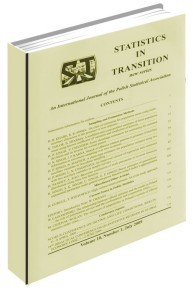A general Bayesian approach to meet different inferential goals in poverty research for small areas
A general Bayesian approach to meet different inferential goals in poverty research for small areas
Author(s): Partha Lahiri, Jiraphan SuntornchostSubject(s): Business Economy / Management
Published by: Główny Urząd Statystyczny
Keywords: Bayesian model; cross-validation; hierarchical models; Monte Carlo simulations
Summary/Abstract: Poverty mapping that displays spatial distribution of various poverty indices is most useful to policymakers and researchers when they are disaggregated into small geographic units, such as cities, municipalities or other administrative partitions of a country. Typically, national household surveys that contain welfare variables such as income and expenditures provide limited or no data for small areas. It is well-known that while direct survey-weighted estimates are quite reliable for national or large geographical areas they are unreliable for small geographic areas. If the objective is to find areas with extreme poverty, these direct estimates will often select small areas due to the high variability in the estimates. Empirical best prediction and Bayesian methods have been proposed to improve on the direct point estimates. These estimates are, however, not appropriate for different inferential purposes. For example, for identifying areas with extreme poverty, these estimates would often select areas with large sample sizes. In this paper, using real life data, we illustrate how appropriate Bayesian methodology can be developed to address different inferential problems.
Journal: Statistics in Transition. New Series
- Issue Year: 21/2020
- Issue No: 4
- Page Range: 237-253
- Page Count: 17
- Language: English

